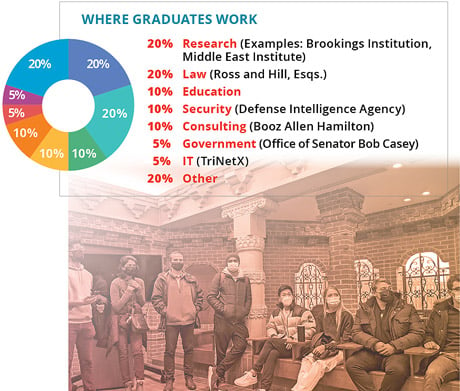2022 In-Demand Careers
THIS GUIDE IS NO LONGER ACTIVE. For the current FP Guide, click here.
Carnegie Mellon University, Institute for Politics and Strategy
Marrying Technology and International Relations for Today’s Job Market
 When students at Carnegie Mellon University’s Institute for Politics and Strategy (IPS) begin coursework, they can take traditional classes on diplomacy, warfare, and global economics. Yet, they may also encounter applied machine learning, software architecture, and dynamic network analysis.
When students at Carnegie Mellon University’s Institute for Politics and Strategy (IPS) begin coursework, they can take traditional classes on diplomacy, warfare, and global economics. Yet, they may also encounter applied machine learning, software architecture, and dynamic network analysis.
Combining technology with politics and international relations is a specialty at IPS, where students can draw upon Carnegie Mellon’s resources as one of the top-ranked computer science schools in the country. The result is education tailored to address an increasing demand for technologically skilled professionals who understand the global political landscape.
“One of the reasons the Institute for Politics and Strategy has taken off is because CMU does have this great tech reputation,” says Molly Dunigan, a senior lecturer at IPS and senior political scientist at the RAND Corporation, a US nonprofit global policy think tank. “We bring this very interesting marriage of national security and technology that you don’t necessarily see in a lot of other programs.”

“We bring this very interesting marriage of national security and technology that you don’t necessarily see in a lot of other programs.” –Molly Dunigan, Senior Lecturer, Institute for Politics and Strategy, Carnegie Mellon University
For example, the school’s Master of Information Technology Strategy (MITS) program is offered jointly by IPS, the College of Engineering, and the School of Computer Science. Students can choose an emphasis in data analytics, information security, politics and strategy, or software and networked systems.
Of course, students at IPS also study politics and international relations, with an option to dive deeply into modern global affairs. “We have a lot of electives on really interesting things,” Dunigan observes. “Social media analysis, terrorism and insurgency, and the privatization of warfare—really targeted military strategy-type things.”
 Those are some of the topics students can explore through the two-year Master of Science in International Relations and Politics (MS IRP) program, in addition to coursework in one of four specializations—international security, international relations, American politics, and comparative politics. As part of the curriculum, students develop methodological skills to conduct advanced quantitative and qualitative research.
Those are some of the topics students can explore through the two-year Master of Science in International Relations and Politics (MS IRP) program, in addition to coursework in one of four specializations—international security, international relations, American politics, and comparative politics. As part of the curriculum, students develop methodological skills to conduct advanced quantitative and qualitative research.
IPS’s programs have been designed from a philosophy that emphasizes personalized education and practical experience. Depending on their course of study, students may be encouraged—and sometimes required—to complete an internship and write a thesis.
When students graduate, many find jobs quickly. Since 2018, 95 percent of graduates from IPS with a MITS degree and 85 percent of MS IRP graduates have secured employment within three months of graduation. They were hired by a range of organizations, such as the Brookings Institution, federal and state governments, Deloitte, Barclays, Cisco, and Google.
Dunigan says employer demand for these skill sets is likely to continue: “The trends for careers in those fields have just been off the charts within the past decade.”
Contact
https://www.cmu.edu/ips
[email protected]
412-268-8715![]()
Contents
- 2022 In-Demand Careers
- University of Notre Dame, Keough School of Global Affairs
- Yale University, Jackson Institute for Global Affairs
- Johns Hopkins University School of Advanced International Studies
- George Mason University, Schar School of Policy and Government
- Carnegie Mellon University, Institute for Politics and Strategy
- University of Arkansas, Clinton School of Public Service
- UC San Diego, School of Global Policy and Strategy
- Johns Hopkins Bloomberg School of Public Health
- Texas A&M University, The Bush School of Government & Public Service
- The Citadel
- Tufts University, The Fletcher School